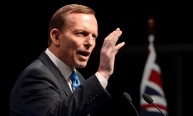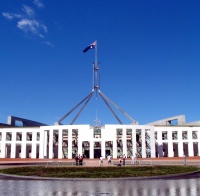- About Us
- Columns
- Letters
- Cartoons
- The Udder Limits
- Archives
- Ezy Reading Archive
- 2024 Cud Archives
- 2023 Cud Archives
- 2022 Cud Archives
- 2021 Cud Archives
- 2020 Cud Archives
- 2015-2019
- 2010-2014
- 2004-2009
 |
(May 2014) When A Government Lacks Self-Respect |
No political system can be considered democratic unless it features a high degree of respect. The people need to show respect towards the few who are elected to govern. The political elites must reciprocate by treating the people with respect. Recently in the Australian polity there have emerged signs of a crisis in this system of mutual respect. The major parties have assumed that lying to the people is legitimate political behaviour. The electorate has been made cynical by continuous revelations about parties promoting people whose conduct can be described as at best self-serving and at worst corrupt. Rather than correct such nasty trends, the Abbott Government is actively leading the decline in respect.
This lack of respect has been most obvious in the delivery of the Abbott Government’s budget. The Labor Opposition has attacked the Liberal-National Coalition Government on the grounds that Prime Minister Abbott was breaking clearly expressed election promises in his eagerness to cut government expenditure. Mr Abbott has shrugged off such criticism by claiming that it was his duty to bring the budget into balance after the extravagance of the previous Labor Governments (2007-2013). But considering that Mr Abbott led the Coalition to victory despite an earlier admission that he routinely lies for political purposes, voters must realise that they collectively endorsed a cynical Prime Minister.
While a budget might be an important economic instrument, it is also an indicator of social policy. The 2014 Budget has been described as a budget for the rich, Dickensian, cruel and class war. Despite the Government’s rhetoric that everyone would have to tighten their belts and that ‘we are all in this together’ the impact of the spending cuts falls disproportionately on the most vulnerable members of society. The budget provisions express the Coalition’s extreme right, pro-capitalist ideology. Social welfare advocates have warned that the budget will throw low income earners and those on fixed incomes further into crisis.
Those commentators with any vision of a fair society have condemned the budget as incompatible with a compassionate future. The rugged individualism of the ‘neocons’ assumes that those who are coping do so because of their intrinsic worth, while those who become victims do not deserve to survive. The society they envisage is better off without such passengers. What they will never admit is that they have themselves created the conditions under which those whom they admire, namely the comfortable middle classes, prosper at the expense of the numerically growing mass of people on the outer.
The society they envisage is better off without such passengers. What they will never admit is that they have themselves created the conditions under which those whom they admire, namely the comfortable middle classes, prosper at the expense of the numerically growing mass of people on the outer.
When the Howard Coalition Government came to power in 1996, the then Prime Minister expressed a desire to make Australia the world’s biggest ‘share-holding democracy’. The drive to privatise profits while allowing debt to remain public brought about a dramatic change in Australia’s political culture. Even as late as the 1980s, workers assumed that a largely tacit contract maintained the idea of a ‘social wage’. Because government supplied free health and education, demands on the pay packet were kept moderate. But increasingly, those powerful Australians who did not depend on a wage came to believe that universal free education and health services placed a drain on their resources, while they did not themselves derive direct benefit from such services. The neocon revolt against the bogey of the ‘nanny state’ was joined by many of the new investing class as they aspired to greater riches.
Among the most obvious signs of Government’s disdain for the public is the Budget’s provision for a seven dollar payment for visits to a general practitioner. Formerly, patients did not hand over any cash when visiting a GP who ‘bulk-billed’ the government for services. The introduction of cash payments will change the relationship considerably, not least because some patients will be denied a consultation and it is feared that many will choose not to attend if they cannot pay. The health ministers of some states have suggested that they could arrange for GPs to see their patients in public hospitals which would effectively pass responsibility for the costs back to the federal government. They have also expressed a fear that sick people will remain untreated until their conditions become critical, so that they will present at the emergency rooms of hospitals anyway, so throwing that system into crisis.
The government’s disrespect for the people was clearest when the Treasurer attempted to place the seven dollar payment into perspective. The perspective he chose was absolutely insulting. Mr Hockey suggested that people should compare this amount with the price that they pay for beer or tobacco. It was immediately clear that the Treasurer has no idea of what people spend their money on, nor indeed of how much disposable income they have.
Perhaps the Treasurer thought that it would do people good to go without such unhealthy purchases. Even if he were entitled to make such an observation however, the hypocrisy in this statement is appalling. This is a government that has preached endlessly against the nanny state as a terrible brake on individual enterprise. Yet now the Treasurer claims that he thinks he should be able to demand that people place a seven dollar restraint on what he sees as their luxury spending. This is highly patronising – its assumptions about the role of government in the lives of people contradict the neocon aversion to the welfare state.
Rather than forgo beer and tobacco, people might cut seven dollars from spending on children’s educational needs, respite care for parents of children with severe disabilities, a taxi home from the supermarket with frozen foods, a telephone call to a son or daughter working overseas or heating for a July night. These items are not luxuries but necessities for the maintenance of a physically and mentally healthy life.
The fact that the Treasurer did not choose to highlight these possible sacrifices suggests that he either does not know people need such things or that he does not care. Given the general tenor of his remarks, the latter seems more likely. Community aid groups know that there are already more people living on the edge in Australia than ever before. The Government’s attitude here seems to be that if people cannot cope, then the state has no role in supporting them. Let them and their families fall apart. And yet, it is the Government itself which decides economic priorities and panders to the demands of the already rich and powerful.
Surveys of opinion have consistently shown that Australians would prefer the maintenance of the welfare state to having tax cuts. They realise the importance the common wealth makes to the social harmony which is essential to the happiness of all. Perhaps they recognise that if the rich are locked into gated estates, then we will all be the poorer. The Abbott Government might well be about to revolutionise Australian political culture. By making savage cuts in the 2014 Budget, it has prepared the ground for offering tax cuts in a Budget before the next election. In other words, it may have removed any choice between welfare cuts and tax cuts knowing that people are more likely to accept the tax cuts as their due if the welfare provisions have already been removed from the balance. The reason that this is revolutionary is plain – it appeals to the self interest of individuals not just as the paramount motivation for political choice, but as the only motivation.
Perhaps they recognise that if the rich are locked into gated estates, then we will all be the poorer. The Abbott Government might well be about to revolutionise Australian political culture. By making savage cuts in the 2014 Budget, it has prepared the ground for offering tax cuts in a Budget before the next election. In other words, it may have removed any choice between welfare cuts and tax cuts knowing that people are more likely to accept the tax cuts as their due if the welfare provisions have already been removed from the balance. The reason that this is revolutionary is plain – it appeals to the self interest of individuals not just as the paramount motivation for political choice, but as the only motivation.
All governments try to alter the political landscape temporarily to gain advantage. But to actually change the way Australians think and the values we hold dear is quite an achievement. When asked about whether the Government had broken promises in its budget, the Treasurer said that during the campaign the Coalition had promised to ‘Stop the boats’ and it had stopped the boats. When a government lacks respect for the people, the pronouncements it makes are disdainful. It assumes that the people are entitled to ask only about those matters it wishes to discuss. The more it is allowed to get away with this mendacity and obfuscation the more its self-respect deteriorates. Eventually, such politicians become parodies of themselves and might even laugh at their own foibles. Unfortunately life is seldom a joking matter for the victims of their disrespectful attitudes.
A former academic, Tony Smith has written extensively on a wide range of subjects as diverse as folk music and foreign policy issues in the Australian Review of Public Affairs, the Journal of Australian Studies Review of Books, Overland, the Australian Quarterly, Eureka Street, Online Opinion and Unleashed.
